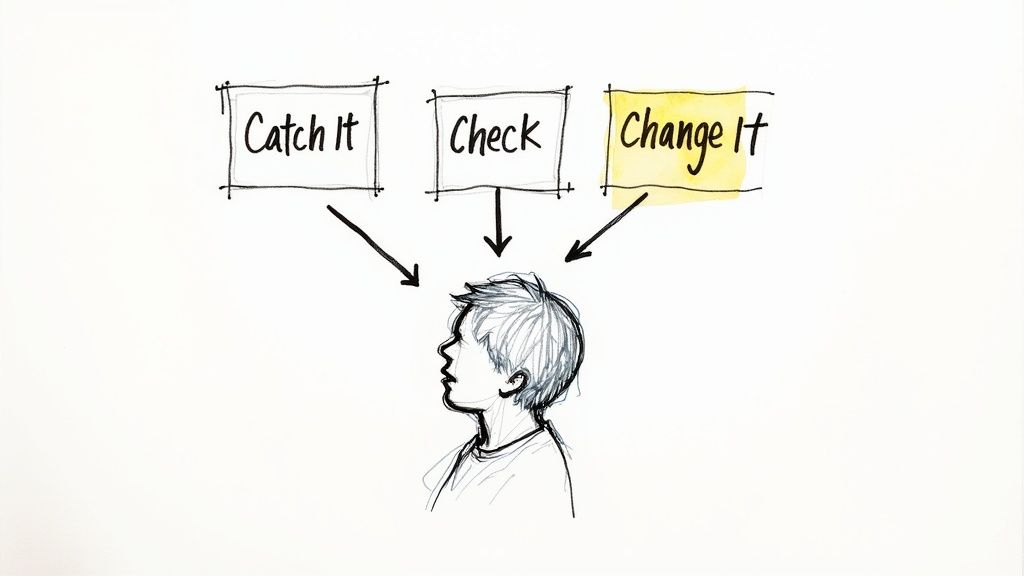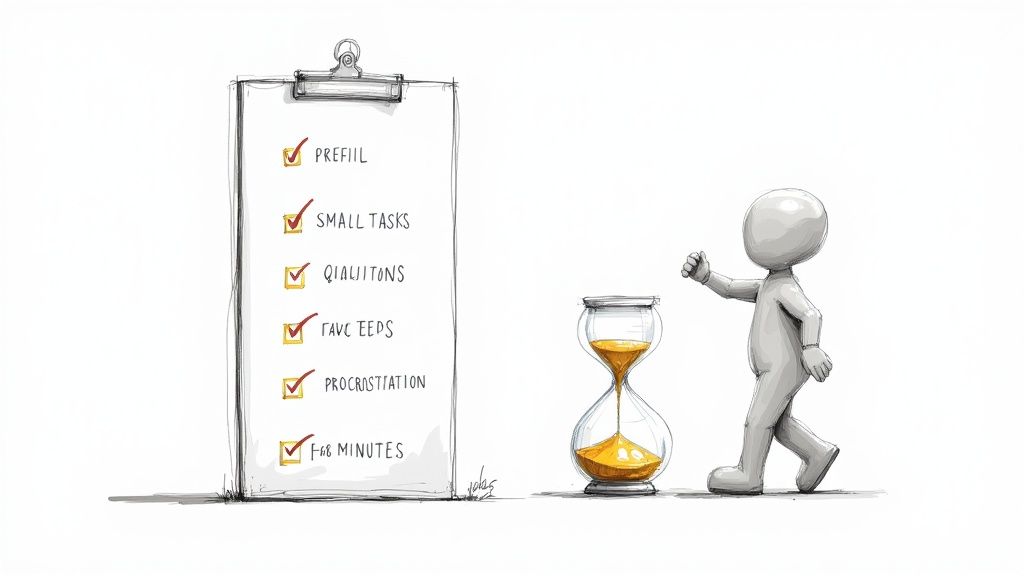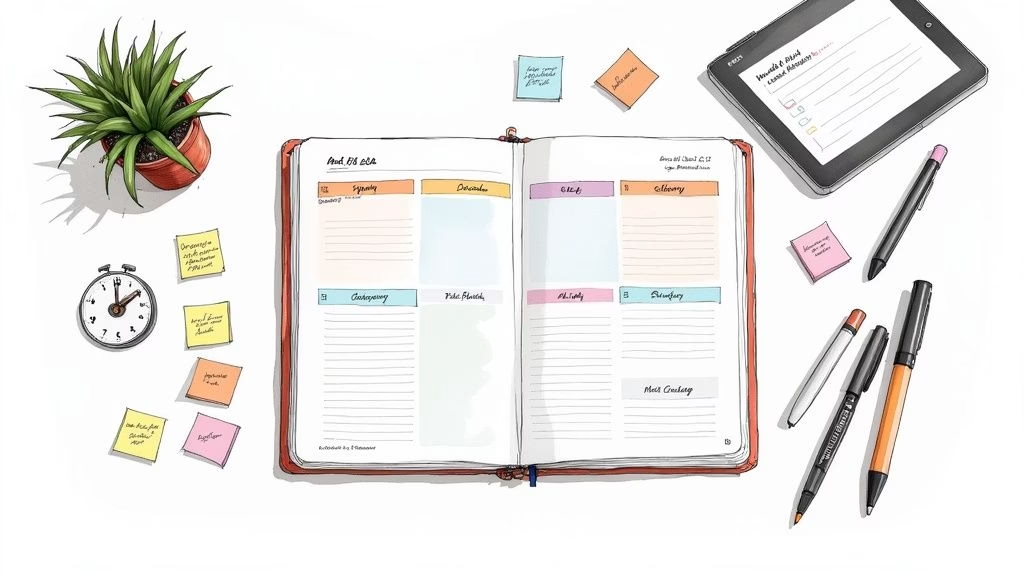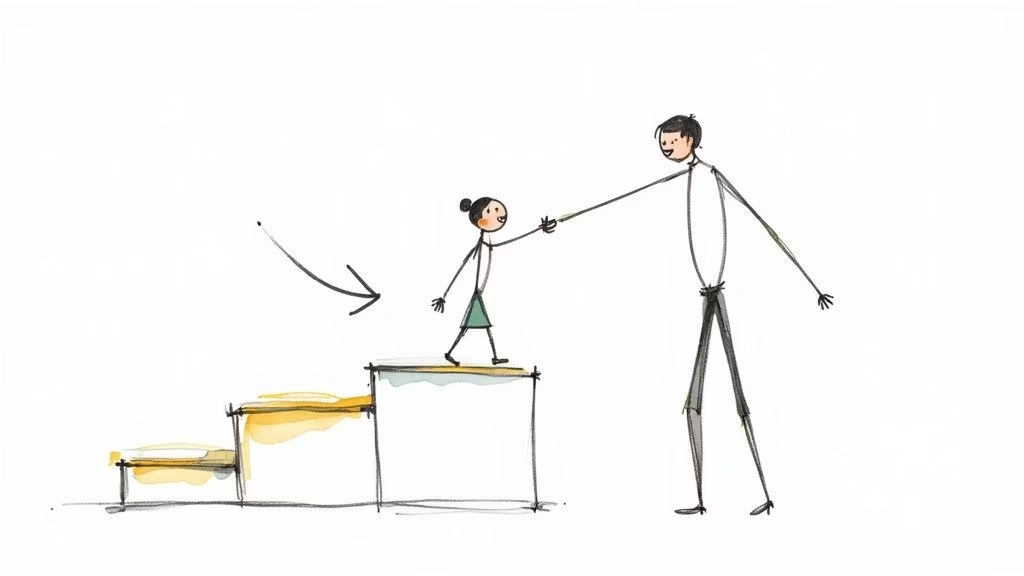Feeling like you're not good enough is a heavy weight to carry. The core of dealing with low self-esteem isn't about becoming someone else. It's about getting back to the real you, seeing the value you already have, and learning to treat yourself with some compassion.
Understanding Why You Feel This Way
If you feel like you’re constantly falling short, you’re definitely not alone. The pressure on teens today is coming from all sides—the curated perfection on social media, the non-stop stress from school, the expectation to have it all figured out. It’s easy to look at all that and feel like you just don’t measure up.
These feelings aren’t a sign that something is wrong with you. They’re a completely valid reaction to a world that asks way too much.
This is a much bigger struggle than most people admit. In fact, low self-esteem is a massive global issue, with some studies suggesting that around 85% of people worldwide experience it at some point. In places like the United States, where there's so much emphasis on success and projecting that perfect image online, those feelings of inadequacy can hit even harder. If you're curious, you can explore more insights on this widespread issue and see just how common it really is.
Before we dive into the "how-to," let's get a clear picture of the strategies that can help you start rebuilding. This table breaks down the core ideas we'll be exploring, giving you a quick, practical roadmap.
Your Quick Guide to Rebuilding Confidence
| Strategy | What It Involves | The Impact |
|---|---|---|
| Challenge Negative Self-Talk | Identifying and questioning the critical inner voice that tells you you're not good enough. | It breaks the cycle of self-criticism and helps you see situations more realistically. |
| Set Small, Achievable Goals | Breaking down big tasks into manageable steps to create a track record of wins. | Every small success builds momentum and proves to your brain that you can do things. |
| Focus on Your Strengths | Shifting your attention from your perceived weaknesses to the things you're naturally good at. | This builds a foundation of self-worth based on your authentic abilities. |
| Practice Self-Compassion | Treating yourself with the same kindness you'd offer a friend when you make a mistake. | It reduces shame and allows you to learn from setbacks instead of being defined by them. |
| Limit Social Comparison | Consciously reducing time on platforms that trigger comparison and unfollowing accounts that make you feel bad. | This protects your mental space and helps you focus on your own journey, not someone else's highlight reel. |
Think of these as your starting toolkit. Each one is a practical way to start shifting your mindset from self-doubt to self-respect.
Why It's So Hard for Teens
For teenage guys, it often feels like there’s an unspoken rule: “be strong,” “figure it out on your own.” This makes it incredibly hard to talk about feeling overwhelmed or not good enough. That pressure can feed a nasty cycle of procrastination and low motivation, where the fear of failing makes it feel impossible to even start that homework assignment or study for that test.
The first real step is to understand these external pressures. It helps you shift the blame from "what’s wrong with me?" to "what challenges am I facing?" That simple change in perspective is huge. It gives you the power to start building yourself up with real tools and a healthier mindset.
Here are a few of the big ones:
- Academic Stress: The constant push for grades and college applications can make it feel like your entire self-worth is tied to a report card.
- Social Comparison: You scroll through Instagram or TikTok and all you see are highlight reels. It’s almost impossible not to compare your real, messy life to someone else's curated perfection.
- Pressure to Fit In: Trying to find your place in social groups can feel like walking on a tightrope, where one wrong move could mean social disaster.
Your feelings are a normal response to an abnormal amount of pressure. Recognizing this isn’t an excuse—it's the starting point for building real, lasting confidence on your own terms.
This guide is all about actionable strategies, not just vague advice. We're going to get into how to manage procrastination, build motivation that actually lasts, and find resources that are specifically out there for teen guys who are going through it.
How to Challenge Your Inner Critic
We all have that negative voice in our heads. It’s the one that pipes up after a tough exam to tell you you’re not smart enough, or whispers that you're a loser when you feel left out. That voice—your inner critic—can be incredibly loud and convincing.
But it doesn't have to run your life.
Instead of just slapping on a "be positive" sticker, which usually feels fake and doesn't last, we're going to get practical. There's a simple but powerful cognitive-based method you can use the moment that critical voice shows up.
Catch It, Check It, Change It
This isn't about ignoring the voice; it's about intercepting it. This three-part process helps you catch negative thoughts before they spiral, question their validity, and reframe them into something that's actually true and helpful.
Let's walk through it with a real-world scenario every teen knows.
First, You Catch the Thought
The first step is just to notice when the inner critic pops up. It’s usually an automatic, harsh judgment that hits you out of nowhere.
- Scenario: You get a C on a math test you actually studied for. The immediate thought hits you: "I'm so stupid. I’ll never be good at this." Boom. You’ve just caught it.
Next, You Check the Thought
Now it's time to play detective. Is that thought 100% true? Does one grade really define your entire intelligence or your future ability in math? Let's look for the evidence.
- Evidence Check: Did you pass the last test? Do you do well in other subjects? Is it possible the test was just really tough, or that you were having an off day? Almost always, the answer is yes. The thought "I'm so stupid" crumbles when you hold it up to the actual facts.
Finally, You Change the Thought
The last step is to replace the overly critical thought with one that's more balanced and accurate. This isn't about sugarcoating—it's about being honest with yourself.
- New Thought: Instead of "I'm so stupid," you could try: "This grade is disappointing, but it doesn't mean I'm a failure. I'm going to ask the teacher for help on the topics I struggled with."
This simple shift moves you out of a place of shame and into a place of action. Challenging these automatic thoughts is a huge part of overcoming limiting beliefs and rewriting your personal narrative. It puts you back in the driver's seat.
Remember, the goal isn't to silence your inner critic completely. It's to stop letting the untrue, unhelpful thoughts call the shots. You're the one in charge here, not that voice.
Flipping the Script on Self-Criticism
Think of this process like practicing a sport or learning an instrument. At first, it feels awkward talking back to that inner voice. But the more you do it, the more you build new mental muscle memory, and soon it becomes second nature.
To really make a lasting change, this practice goes hand-in-hand with self-compassion. It's about learning to treat yourself with the same kindness you'd give a friend who messed up. If you're ready to dig deeper, this guide on how to build self-compassion without giving up is a great place to start. It’s a powerful skill that can truly quiet the harshest critic of all—yourself.
Overcoming Procrastination and School Stress
Low self-esteem and procrastination often go hand in hand. That huge project or looming exam can feel less like a school assignment and more like a direct threat to your self-worth. It’s easier to just avoid it. The inner critic starts whispering, "What if you fail? What if you're not smart enough?" So you put it off, which, ironically, just dials up the stress.
This kicks off a pretty brutal cycle. You procrastinate because you’re anxious, and then you feel even more anxious because you’ve procrastinated. It's a heavy weight to carry, especially when academic pressure is already cranked to the max. The connection is real, too; one study found that adolescents who were dissatisfied with their lives were over seven times more likely to report having low self-esteem.
Breaking Down the Overwhelm
The only way to escape this cycle is to make the tasks feel less intimidating. When an assignment seems like an unclimbable mountain, your brain’s natural reaction is to shut down. The fix? Break that mountain down into a series of small, manageable hills.
This is where you can get strategic. Instead of just staring at a blank page for an essay, focus on one tiny step forward.
- The Five-Minute Rule: Just commit to working on something for five minutes. Seriously, that’s it. Anyone can do five minutes. The hardest part is almost always just starting, and this tiny commitment is often all it takes to build a little momentum.
- Task Chunking: Break big, vague projects into small, specific actions. "Write research paper" is overwhelming. But "Find three sources" or "Write the first paragraph"? Those are goals you can actually achieve.
- Celebrate Small Wins: Every time you complete one of those small tasks, acknowledge it. This isn't about throwing a party—it’s about giving yourself a mental high-five. It tells your brain, "Hey, I did that," and slowly starts building back your confidence.
Learning how to stop procrastinating for good is really about retraining your brain to focus on progress, not perfection.
A "good enough" assignment that you actually turn in is infinitely better than a "perfect" one that never gets finished. Letting go of the perfectionist mindset is what allows you to move forward and feel a sense of accomplishment again.
Balancing School and Your Well-being
Constant school pressure with zero breaks is a fast track to burnout and even lower self-esteem. It is absolutely crucial to protect your time and energy outside of your schoolwork. Setting boundaries isn't just an "adult" skill; it's a vital tool for managing stress as a teen.
You have to carve out a healthy balance between your academic responsibilities and your own life. Learning to say no, setting aside time for rest, and making space for hobbies will dramatically reduce your stress and improve your mental well-being. For more ideas on this, check out this guide to achieve a better work-life balance.
Remember, your grades don’t define your worth as a person. By tackling procrastination with small, consistent steps and making your mental health a priority, you can take back control and build the confidence you need to succeed—both in school and out of it.
A Simple Meditation Guide for Teens
Meditation can feel like a big, intimidating concept, but it's really just about giving your mind a break. It’s a powerful tool for dealing with low self-esteem because it creates space between you and your thoughts—especially the negative ones that drag you down.
It’s not about emptying your mind. It’s about learning to watch your thoughts without getting tangled up in them.
Think of it like sitting on the side of a road and watching the cars (your thoughts) drive by. You don't have to chase after every single one. Seriously, just five minutes a day can make a huge difference in managing stress and disconnecting from that harsh inner critic.
A Simple Five-Minute Meditation
Ready to try? This isn't about doing it perfectly; it's just about showing up. Find a quiet spot where you won't be interrupted for a few minutes.
- Get Comfortable: Sit in a chair with your feet on the floor, or cross-legged on the ground. Let your hands rest in your lap and gently close your eyes.
- Focus on Your Breath: Take three deep breaths. In slowly through your nose, out slowly through your mouth. Don't force anything—just let your breath find its own natural rhythm.
- Just Notice: Your mind is going to wander. That’s totally normal and expected. When you notice a thought, just acknowledge it without judging it and gently guide your attention back to the feeling of your breath.
- Practice Self-Compassion: As you sit, silently repeat a kind phrase to yourself. It could be, "I am doing my best," or "It's okay to feel this way." This is how you start replacing self-criticism with self-acceptance.
The real goal of meditation isn't to silence your thoughts—that's impossible. It's to stop letting them control you. By practicing this, you learn that you are not your thoughts; you are the one observing them.
Tools to Help You Get Started
You don't have to figure this out alone. There are some amazing, user-friendly apps designed to guide you. They make starting a meditation practice feel simple and accessible, even if you’ve never tried it before.
- Headspace: This app is known for its fun, animated guides that make mindfulness concepts super easy to understand.
- Calm: Offers a huge library of guided meditations, sleep stories, and relaxing music to help quiet anxiety.
Using these resources can help you build consistency. For a deeper dive into how meditation specifically benefits teens, you can check out our guide on meditation for teens, which has more techniques and insights.
These simple practices help you build a stronger, more compassionate relationship with yourself. And that’s the foundation for overcoming low self-esteem.
Finding Support When You're Told to "Tough It Out"
Let's be real: society has a script for guys. Be tough. Handle it yourself. Don't show weakness. But carrying the weight of low self-esteem isn't a weakness—it's just heavy. And asking for help is one of the strongest things you can do.
This section is for all the young men navigating those pressures. Finding the right people to have in your corner is a game-changer, whether that means linking up with other guys who just get it or finding a professional who can offer real guidance without judgment.
Why Talking to Other Guys Helps
There's something incredibly powerful about connecting with other guys who are in the same boat. It shatters that feeling of isolation that often comes with self-doubt.
The moment you realize you're not the only one feeling this way, the shame starts to lose its power. Men's groups and online forums create a space where you can drop the act and just be honest.
- HeadsUpGuys: This is a fantastic online resource built specifically for men. It's packed with practical tips, stories from guys who've been there, and even self-check tools to help you manage your mindset.
- The Jed Foundation (JED): JED provides a ton of great resources for teens and young adults, focusing on emotional health and suicide prevention. They have programs specifically for high school and college students.
A Quick Reset When Your Brain Says "No"
Ever stare at a textbook and feel completely stuck? Procrastination isn't just laziness—it's often your inner critic yelling so loud you can't think. A super-short meditation can help you hit the reset button.
Try this for just two minutes.
- Find a quiet spot and get comfortable.
- Close your eyes. Take a deep breath in through your nose, and let it out slowly through your mouth.
- Acknowledge the stress without fighting it. Just say to yourself, "This feels hard right now."
- Think of one small thing you can do to start. Just one. Picture yourself doing it, like simply opening your laptop.
- Take one more deep breath, and open your eyes.
This isn't about solving everything at once. It's about quieting the noise just enough to take that first step.
A Note for Parents
Watching your son struggle with his self-esteem is tough, and it's easy to feel helpless. But your support at home is a massive part of the equation. You have the power to create a space where he feels safe to be himself.
Your job isn't to "fix" him—it's to be a steady, supportive presence. Instead of trying to solve his problems, validate his feelings. A simple, "It sounds like you're going through a really tough time," means so much more than dismissing his worries.
Make listening your superpower. Let him talk more than you do. And when you give praise, focus it on his effort and resilience, not just his wins. Celebrating the hard work—whether he gets an A or a C—builds a sense of worth that isn't tied to performance. That's how you help him build real, lasting resilience.
It's crucial to know where to turn for reliable help. The resources below are dedicated to supporting teens and young men through the challenges of mental health and self-esteem.
Mental Health Resources for Teens and Young Men
| Resource | What They Offer | Who It Is For |
|---|---|---|
| Crisis Text Line | Free, 24/7 text-based mental health support and crisis intervention. | Anyone in crisis who prefers texting over calling. |
| The Trevor Project | Crisis intervention and suicide prevention services for LGBTQ young people. | LGBTQ youth under 25. |
| 988 Suicide & Crisis Lifeline | Free, confidential support for people in distress, 24/7. | Anyone experiencing a suicidal, substance use, or mental health crisis. |
| Man Therapy | An online tool using humor to help men address mental health issues. | Men who may be resistant to traditional therapy. |
Remember, reaching out is a sign of strength, not weakness. These organizations exist because you don't have to go through this alone. There are people ready to listen and help, anytime you need it.
How Parents Can Support a Teen with Low Self Esteem
Watching your teen go through the wringer with low self-esteem is one of the hardest things for a parent. It’s tough to see them hurting. But your support can be the anchor they need to find their footing.
The goal isn't to swoop in and "fix" everything. It's about creating a home where they feel seen, heard, and valued for who they are, right now, even on the hard days.
One of the most powerful things you can do is learn the art of active listening. When your teen finally opens up—and sometimes those moments are rare—the instinct is to jump in with advice. Resist that urge.
Just listen. Your goal is to understand, not to solve. A simple, "Wow, that sounds really tough," can mean the world. It tells them you're in their corner, no judgment attached.
It's important to recognize that this isn't just a fleeting mood. The link between how a teen sees themselves and their overall mental health is incredibly strong. In a recent study, Mental Health America found that a staggering 54% of teens at risk for a mental health condition pointed to low self-esteem as a major factor. You can read more about these mental health findings to get a clearer picture of the landscape. This isn't something to brush off; it's a serious signal that they need support.
Practical Ways to Offer Support
The small, everyday interactions are where you can build a real foundation of resilience. Try shifting your praise from what they achieve to how they try.
Instead of only celebrating the "A" on the test, acknowledge the hours they spent studying. This simple tweak helps them build a growth mindset, detaching their self-worth from their performance.
For teen boys, this can be especially tricky. Society drills into them that they need to be tough and have it all together, which makes opening up feel like a weakness. Creating a space where it's safe to be vulnerable is a game-changer.
- Make Mental Health Normal: Talk about mental health openly in your family. Frame getting help as a sign of strength, just like going to a doctor for a broken arm.
- Be a Partner in Their Search: Don't just hand them a phone number. Explore resources with them, like checking out sites like HeadsUpGuys or looking into local teen groups. It shows you're on their team.
- Show, Don't Just Tell: Share your own struggles in an age-appropriate way. Letting them see that you don't have it all figured out either makes it okay for them to feel the same.
A Quick Guide to Teen Meditation
Sometimes, the best support you can offer is a tool they can use themselves. Meditation can feel intimidating, but it doesn't have to be. A simple practice can help them quiet that nagging inner critic that fuels things like procrastination and school anxiety.
You can guide them through a simple five-minute exercise.
First, have them find a quiet spot where they won't be interrupted.
Next, encourage them to just focus on their breath—a few slow, deep breaths to get centered.
Remind them that the goal isn't a totally empty mind. Thoughts will pop up. The practice is just to notice them without getting caught up in them, then gently bring their focus back to their breath.
This simple act builds real emotional muscle. Your job isn’t to be a meditation guru, but to be a steady, calm presence. Remind them that your love and support are unconditional. That security is the ultimate foundation as they learn how to navigate the ups and downs of self-esteem.
Unpacking a Few Common Questions
Building self-esteem isn't like flipping a switch. It's a journey, and like any journey, it's natural to have questions about the road ahead. Here are a few things parents and teens often ask.
How Long Does This Actually Take?
There’s no magic number here. Improving how you see yourself is all about building and practicing new mental habits, day in and day out. It’s not about an overnight fix.
You can start to feel a real shift in just a few weeks by consistently challenging those negative thoughts and celebrating small wins. Did you use the five-minute rule to finally start that tough history paper you've been avoiding? That's a win. The key is patience. Focus on the progress you're making, not on being perfect.
Self-esteem is your overall sense of self-worth—how you value and respect yourself as a person. Confidence is more specific; it’s your belief in your ability to handle a certain task. When you build that core self-esteem, you'll find your confidence grows right along with it.
For teen guys, this can be especially tough. The pressure to "tough it out" is real. Finding a supportive community can be a game-changer. Groups like HeadsUpGuys and other men's forums offer a space to connect with people who get it. They show that reaching out is a sign of strength, not weakness.
When Is It Time for Professional Help?
This is a big one for parents. When does a rough patch become something more? If low self-esteem is leading to persistent sadness, anxiety, avoiding school, or is starting to damage relationships, it’s a good sign that it's time to bring in a professional.
Think of a therapist as a coach for the mind. They provide personalized strategies and a safe, non-judgmental space to work through what's holding you back.
Simple tools can also make a huge difference in the meantime. A five-minute guided meditation focused on self-compassion can be a powerful way for a teen to quiet their inner critic and manage stress. It’s a practical skill they can use anytime, anywhere. The goal is to build a toolkit of healthy ways to cope when life gets overwhelming.
At Andrew Petrillo Life Coaching, I work with teens to build the personalized strategies they need to beat procrastination, manage stress, and develop a sense of confidence that lasts. If your teen is struggling to find their footing, a complimentary discovery call could be the first step toward unlocking their potential. You can learn more and book your call here.

























